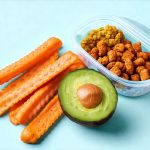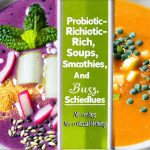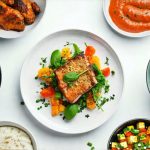The relentless pace of modern professional life often leaves little room for self-care, particularly when it comes to nutrition. Between demanding workloads, frequent travel, and packed schedules, maintaining a healthy diet can feel like an insurmountable challenge. Many busy professionals and travelers fall into patterns of quick, convenient foods that, while satisfying in the moment, frequently lack the essential nutrients needed to support energy levels, cognitive function, and overall well-being. This often leads to digestive issues, reduced immunity, and long-term health concerns. The good news is that prioritizing gut health doesn’t require a complete lifestyle overhaul – it’s about making informed choices and incorporating simple strategies into your existing routine.
A healthy gut isn’t merely about digestion; it’s the cornerstone of systemic health. Increasingly, research reveals the profound connection between our gut microbiome (the trillions of bacteria residing in our digestive system) and everything from mental clarity to immune response. When the gut is out of balance – a condition known as dysbiosis – it can manifest as fatigue, bloating, mood swings, even chronic illness. For busy professionals constantly on-the-go, this imbalance is easily exacerbated by stress, irregular meal times, and poor dietary choices. Building a gut-friendly meal plan isn’t about restrictive dieting; it’s about nourishing the beneficial bacteria in your gut to optimize health and performance. It’s an investment in sustained energy, improved focus, and resilience against the demands of a hectic lifestyle.
Understanding The Gut & Its Nutritional Needs
The human gut is a complex ecosystem, home to billions of microorganisms – both beneficial and harmful. Maintaining a healthy balance between these microbes is crucial for optimal digestion, nutrient absorption, immune function, and even mental health. Prebiotics feed the good bacteria in your gut, while probiotics are the live microorganisms themselves that contribute directly to a thriving microbiome. A diet rich in both prebiotics and probiotics forms the foundation of a gut-friendly meal plan. Beyond these two key components, focusing on whole, unprocessed foods is paramount. Minimizing sugar intake, reducing processed food consumption, and staying adequately hydrated all play vital roles in supporting gut health.
The typical Western diet, characterized by high levels of processed foods, sugar, and saturated fats, can disrupt the delicate balance of the gut microbiome, leading to inflammation and digestive issues. Conversely, a diet rich in fiber-rich fruits and vegetables, fermented foods, lean proteins, and healthy fats promotes a diverse and resilient gut ecosystem. For busy professionals, this means shifting focus from convenience to nourishment, even amidst demanding schedules. Simple swaps, like replacing sugary snacks with fruit or opting for whole grains over refined carbohydrates, can make a significant difference. Travel often disrupts established routines, making it even more important to proactively plan healthy meal options and pack gut-friendly snacks.
Ultimately, the goal is not perfection but consistency. Small, sustainable changes over time are far more effective than drastic dietary restrictions that are difficult to maintain long-term. Focusing on adding beneficial foods rather than simply eliminating “bad” ones can create a positive relationship with food and make healthy eating feel less like a chore and more like an empowering act of self-care. If nausea is a concern, consider a gentle meal plan.
Practical Meal Planning Strategies For Busy Lifestyles
Meal planning is arguably the most effective tool for maintaining a gut-friendly diet, even amidst a busy schedule. It doesn’t necessarily require hours in the kitchen; it’s about allocating a small amount of time each week to strategize and prepare. Start by identifying your biggest nutritional challenges – are you prone to skipping breakfast? Do you rely heavily on takeout lunches? Once you pinpoint these areas, you can focus on creating solutions. Batch cooking is incredibly useful: preparing large portions of healthy meals on the weekend frees up valuable time during the workweek.
Consider utilizing meal prepping apps or templates to streamline the process. These tools can help you generate shopping lists, track nutritional information, and even suggest recipes based on your dietary preferences. Don’t underestimate the power of simple grab-and-go options like pre-cut vegetables with hummus, yogurt with berries, or a handful of nuts and seeds. For travelers, packing healthy snacks is essential to avoid relying on airport food or convenience store options. Think travel-sized containers of trail mix, protein bars (with minimal added sugar), dried fruit, or even small portions of cooked quinoa salad. Symptom-free meal plans can be particularly helpful when traveling.
Remember that flexibility is key. Life happens, and unexpected events can derail even the best-laid plans. Don’t beat yourself up if you occasionally deviate from your meal plan; simply get back on track with your next meal. Prioritizing mindful eating – paying attention to hunger cues and savoring each bite – can also help prevent overeating and promote better digestion. One-pot meals are great for quick, easy preparation!
Gut-Friendly Breakfast Options
Breakfast often sets the tone for the entire day, making it a crucial meal for gut health. Avoid sugary cereals, pastries, and processed breakfast bars which can disrupt blood sugar levels and negatively impact your microbiome. Instead, focus on options that provide fiber, protein, and healthy fats.
- Overnight oats with berries and chia seeds: A simple and convenient option that provides sustained energy and fiber.
- Greek yogurt with fruit and a sprinkle of nuts: Provides probiotics from the yogurt, antioxidants from the fruit, and healthy fats from the nuts.
- Smoothie made with spinach, banana, protein powder, and almond milk: An easy way to pack in nutrients and support digestion.
- Whole-grain toast with avocado and egg: A balanced breakfast that provides fiber, healthy fats, and protein.
Consider preparing overnight oats or pre-portioning smoothie ingredients the night before to save time in the morning. Experiment with different toppings and flavor combinations to keep things interesting and prevent boredom. If indigestion is an issue, a safe meal plan can be a great starting point.
Travel-Friendly Snack Ideas
Travel can be particularly challenging for gut health due to irregular meal times and limited access to healthy food options. Packing your own snacks is essential to avoid relying on processed foods or skipping meals altogether.
- Trail mix with nuts, seeds, and dried fruit (unsweetened): Provides fiber, healthy fats, and antioxidants.
- Protein bars (low in sugar): A convenient source of protein to keep you feeling full and satisfied.
- Roasted chickpeas: A crunchy and satisfying snack that provides fiber and plant-based protein.
- Whole-grain crackers with nut butter: Offers a balance of carbohydrates, healthy fats, and protein.
- Individual packets of probiotic powder: Can be added to water or juice for an extra boost of gut-supporting microbes.
When flying, opt for fruit or vegetable sticks instead of the airplane snacks offered. Staying hydrated is also crucial during travel, so remember to drink plenty of water throughout your journey.
Incorporating Fermented Foods & Prebiotics
Fermented foods are a natural source of probiotics, helping to replenish and diversify your gut microbiome. Include small amounts of fermented foods in your diet regularly.
- Yogurt (plain, unsweetened): Look for varieties with live and active cultures.
- Kefir: A fermented milk drink similar to yogurt but with a thinner consistency.
- Sauerkraut: Fermented cabbage that’s rich in probiotics and fiber.
- Kimchi: Korean fermented vegetables, often made with cabbage and spices.
- Kombucha: Fermented tea with a slightly fizzy taste.
Prebiotics are essential for feeding the good bacteria in your gut. Include prebiotic-rich foods in your diet to support their growth and activity.
- Garlic and onions: Add these to your cooking for flavor and prebiotic benefits.
- Bananas (slightly green): Contain resistant starch, a type of prebiotic fiber.
- Asparagus: Another excellent source of prebiotic fiber.
- Oats: A versatile grain that provides soluble fiber.
- Apples: Contain pectin, a prebiotic fiber that supports gut health.
By consciously incorporating both fermented foods and prebiotics into your meal plan, you can actively nurture your gut microbiome and promote optimal digestive function. Remember to introduce fermented foods gradually to avoid bloating or discomfort. A liver-friendly meal plan is also worth exploring for holistic health!


















